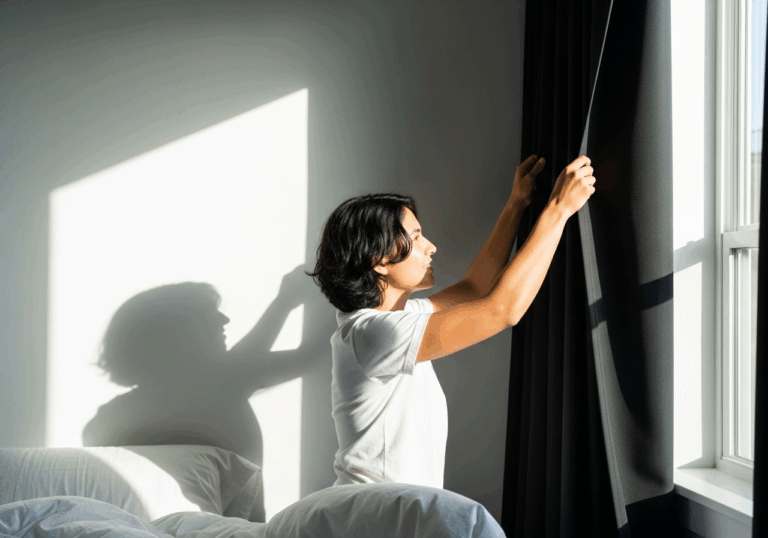Science-Backed Tips
Optimize Sleep with Ideal Bedroom Temperature
Setting your bedroom to 18–20 °C can boost sleep satisfaction by ~10%.
📊 Did you know?
💡 Why It Matters
1️⃣
Improving sleep quality by 10% can significantly enhance daily functioning and mood.
2️⃣
Better sleep can lead to a 20% reduction in daytime fatigue and irritability.
3️⃣
Maintaining optimal bedroom temperature may decrease the risk of sleep disorders in older adults.
✅ Try These Micro-Tips
🎯
Set your bedroom temperature between 18–20 °C for optimal sleep quality.
🎯
Use a fan or air conditioning to maintain a cooler environment during warmer months.
🎯
Monitor your sleep quality with a sleep tracker to assess improvements.
🎯
Limit exposure to screens before bedtime to enhance the effects of a cooler room.
📚 The study
The objective was to explore how varying indoor temperatures affect sleep patterns, with 50 participants monitored in their homes over several months.
The findings revealed a striking correlation: as the indoor temperature increased from approximately 25 to 30 °C, sleep quality declined by up to 10%, a statistically significant change (p < 0.05).
This decline in sleep quality underscores the importance of a cooler ambient environment, which not only promotes deeper sleep but also enhances mood resilience.
Why does this matter? Improving sleep quality by just 10% can lead to significant improvements in daily functioning and mood.
In fact, better sleep can result in a remarkable 20% reduction in daytime fatigue and irritability.
For older adults, maintaining an optimal bedroom temperature is not just a comfort issue; it may also decrease the risk of sleep disorders, paving the way for healthier, more restorative rest.
Therefore, adjusting your bedroom temperature could be a simple yet effective strategy to enhance overall well-being and quality of life for older adults.
❓ Frequently Asked Questions ❓
Learn more
What is the ideal bedroom temperature for better sleep?
The ideal bedroom temperature for optimal sleep quality is between 18–20 °C. This range can improve subjective sleep satisfaction and reduce night awakenings.
How does bedroom temperature affect sleep quality?
As bedroom temperature increases from ~25 to 30 °C, sleep quality can decline by up to 10%. Cooler ambient environments promote deeper sleep and enhance mood resilience.
What are the benefits of improving sleep quality?
Improving sleep quality by 10% can significantly enhance daily functioning and mood. It can also lead to a 20% reduction in daytime fatigue and irritability.
How can I maintain an optimal bedroom temperature?
You can maintain an optimal bedroom temperature by using a fan or air conditioning during warmer months. Monitoring your sleep quality with a sleep tracker can help assess improvements.
What should I do to enhance the effects of a cooler room?
To enhance the effects of a cooler room, limit exposure to screens before bedtime. This practice can improve your overall sleep experience.
Can maintaining a cooler bedroom temperature reduce sleep disorders?
Yes, maintaining an optimal bedroom temperature may decrease the risk of sleep disorders in older adults. Cooler temperatures promote better sleep quality and overall well-being.
How much can subjective sleep satisfaction improve with the right temperature?
Subjective sleep satisfaction can improve by approximately 10% when maintaining a cooler bedroom temperature. This improvement can lead to fewer night awakenings.
What is the significance of the study on bedroom temperature and sleep quality?
The study highlights that a cooler bedroom environment significantly promotes deeper sleep and mood resilience. It emphasizes the importance of temperature management for better sleep quality.
How many participants were involved in the study on bedroom temperature?
The study involved 50 participants who were monitored at home over several months. This real-world approach provided valuable insights into the effects of bedroom temperature on sleep quality.
What happens to sleep quality as indoor temperature rises?
As indoor temperature rises from ~25 to 30 °C, sleep quality can decline by up to 10%. This decline is statistically significant and underscores the importance of maintaining a cooler sleep environment.





